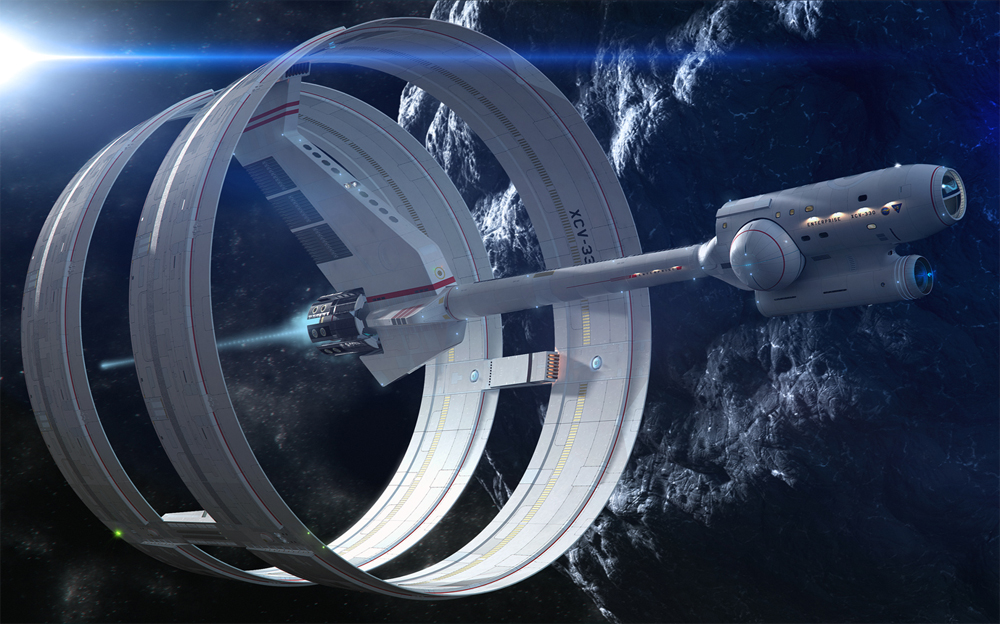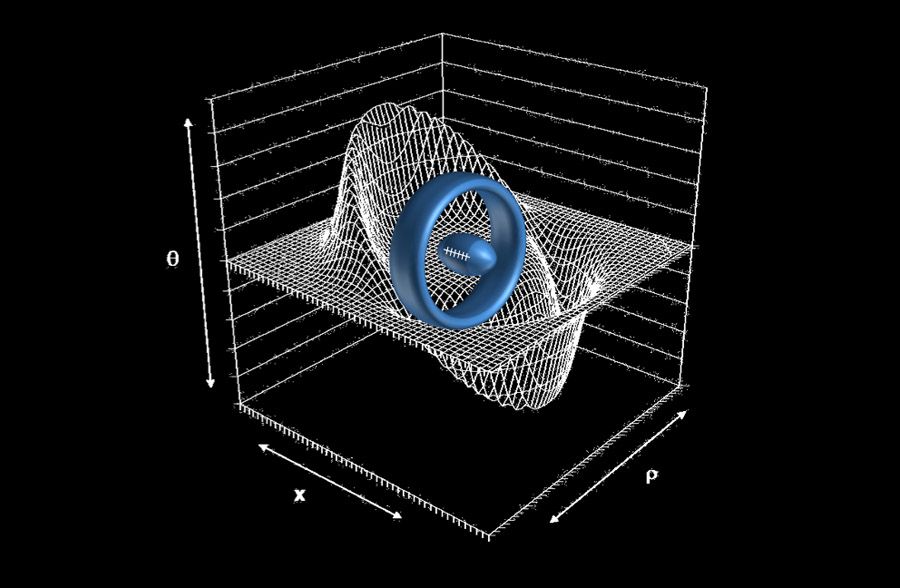Warp drive
-
Now this is interesting.
http://www.space.com/17628-warp-drive-possible-interstellar-spaceflight.html

-
Yes that was an interesting read, so this is how our ships should look http://1.bp.blogspot.com/_KEArRUZspiA/SgYxA3S9JaI/AAAAAAAABOI/QPXKBwZxVZE/s400/warp.bmp
-
Looks like the Vulcan ring ships.

-
Strangely enough iv come across a few ships with this design

-
I hope that when they build it, it will look like this.

-
Omg Marion, that's just ugly, iv found ships in battlestar galactica, star trek, star wars and future concept art for future NASA spacecrafts all with a similar design

-
The point is historical accuracy to Star Trek history, at least in ship design

This is supposed to be one of the first ringships of Earth in the ST univers, but I will not be satisfied until they can make ships with nacelles.

-
Ummm, don't know about that Marion, star trek was based in the future, the opening credits for starwars is always "a long time ago, in a galaxy far far away" in the past, I think jabba the hut had warp drive before captin kirk,

-

-
Hmm. I think that the ring is pretty cool. While space faring vehicles that look designed for atmospheric flight are more pleasing to the eye, that shape is irrelevant in space save for the logic of reducing frontal area exposed to erosion and collision. A sphere would be just as suitable for space flight as a cube or cylinder. Atmosphere no longer being a factor, structural integrity, safety of the occupants, longevity and ease of repair become the overriding factors.
-
@escapeartist said:
Hmm. I think that the ring is pretty cool. While space faring vehicles that look designed for atmospheric flight are more pleasing to the eye, that shape is irrelevant in space save for the logic of reducing frontal area exposed to erosion and collision. A sphere would be just as suitable for space flight as a cube or cylinder. Atmosphere no longer being a factor, structural integrity, safety of the occupants, longevity and ease of repair become the overriding factors.
You know what, the design is kinda growing on me too, infact I might try and model it, but that's something I won't be doing for a while, interesting read, interesting ship, although they may know how the design should be it would be impossible anytime soon to create and store the energy required to manipulate time and space so we are still a long way off unfortunately

-
@iichiversii said:
You know what, the design is kinda growing on me too, infact I might try and model it, but that's something I won't be doing for a while, interesting read, interesting ship, although they may know how the design should be it would be impossible anytime soon to create and store the energy required to manipulate time and space so we are still a long way off unfortunately

You need the same negative energy equivalent to the whole mass of jupiter!! So I've heard...
-
@olishea said:
@iichiversii said:
You know what, the design is kinda growing on me too, infact I might try and model it, but that's something I won't be doing for a while, interesting read, interesting ship, although they may know how the design should be it would be impossible anytime soon to create and store the energy required to manipulate time and space so we are still a long way off unfortunately

You need the same negative energy equivalent to the whole mass of jupiter!! So I've heard...
Is that all

-

Warp Drive May Be More Feasible Than Thought, Scientists Say
Faster than light travel may actually be possible using a warp drive to bend space around a starship. New calculations suggest such a vehicle would require less energy than once thought.
Space (www.space.com)
@unknownuser said:
The only problem is, previous studies estimated the warp drive would require a minimum amount of energy about equal to the mass-energy of the planet Jupiter.
But recently White calculated what would happen if the shape of the ring encircling the spacecraft was adjusted into more of a rounded donut, as opposed to a flat ring. He found in that case, the warp drive could be powered by a mass about the size of a spacecraft like the Voyager 1 probe NASA launched in 1977.
Furthermore, if the intensity of the space warps can be oscillated over time, the energy required is reduced even more, White found.
@unknownuser said:
The Eagleworks team has discovered that the energy requirements are much lower than previously thought. If they optimize the warp bubble thickness and "oscillate its intensity to reduce the stiffness of space time," they would be able to reduce the amount of fuel to manageable amount: instead of a Jupiter-sized ball of exotic matter, you will only need 500 kilograms to "send a 10-meter bubble (32.8 feet) at an effective velocity of 10c.
So 500kg=10m warp bubble at 10c so I wander if you need 5tons for 100 m bubble at 10c or either the speed decreses or you need more exotic matter hmm....
A 100m bubble could house a good sized ship. -
What?

-
What what

-
e=mc² The outcome of which is as you approach the speed of light, your mass increases accordingly, and therefore the energy required to continue.
-
@mitcorb said:
e=mc² The outcome of which is as you approach the speed of light, your mass increases accordingly, and therefore the energy required to continue.
Well yes, you can't go faster than the speed of light because your mass and the energy requeried would be infinite, but they are talking about bending space and time into a bubble around the ship and only that bubble moves faster than light while practically the ship sit still in the space in the bubble. Apparently for that kind that of thing you need some sort of exotic matter and you would need 500kg for a 10m bubble to be projected at 10c.....It would be something if it were possible.
-
@unknownuser said:
Well yes, you can't go faster than the speed of light
Well, we don't actually know. Scientists have controversially discovered particles which outpace light.
-
Theoretically there's nothing 'wrong' with traveling faster than the speed of light.
Just as in the same way there's no problems for us traveling slower than the speed of light.
It's just there's a catch - at the speed of light you need infinite energy, have infinite mass, time stops etc... and if you are just 'near' the speed of light [either side] the effects are also quite problematical for your day-to-day life.
This means that objects traveling very very fast on our side of the light-barrier can't readily accelerate without dire consequences, and in the same way objects traveling above the speed of light can't readily decelerate down towards the speed of light either.
So ne'r the twain shall meet!We are talking about transporting information, as much as physical objects here...
The 'alternative' idea of 'warping' space itself... so that an object has less of a distance to traverse in the same time-frame could have the same effect as traveling faster than the speed of light... but controlling the forces involved in doing this 'wormhole' [or similar] in a way that doesn't squish the traveling object so much that its information is lost, have not been worked out at all well!
Since 'you' are going to be the most important bits of information in the object that is traveling this way, then your chances of 'you' still being 'you' at the other end are, at the moment, very slim...
Also, let's say you did successfully go one way down this 'tube', then how would you return ? Any given 'wormhole' is probably going to be transitory and difficult to fine-tune in where/when it ends up at all, let alone doing it in the exact 'reverse' way - so you might easily arrive back before you left or return long after you departed, either way this would not a satisfactory result...Unfortunately 'Star Trek' et al is/was made with little basis in reality...
Although I really do hope that someone somewhere manages to sort out this seemingly insoluble issue... I won't be one of the first volunteers...
Advertisement







